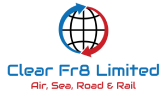UK Fabric & Textile Imports
Clear Fr8 Limited are able to assist with all Fabric and Textile imports to the UK.
The United Kingdom has a rich history in the textile industry, known for its quality fabrics and diverse range of textiles. While the country does have its own textile manufacturing capabilities, it also relies on importing fabric and textiles from various countries to meet the demands of its domestic market. This article aims to provide an overview of importing fabric and textiles to the UK, including the process, considerations, and the significance of this trade.
Importing fabric and textiles to the UK involves a series of steps that need to be followed to ensure a smooth and compliant process. Firstly, importers must identify suitable suppliers and manufacturers in other countries. Popular sourcing destinations for fabric and textiles include countries like China, India, Bangladesh, Turkey, and Italy, among others. These countries offer a wide range of options in terms of fabric types, designs, and price points.
How to import fabric and Textiles to the UK
Once suppliers are identified, the importer needs to establish communication channels and negotiate the terms of the trade, including price, quantity, quality standards, and delivery timelines. Contracts and agreements are often put in place to protect both parties' interests and ensure a transparent and fair business relationship.
After reaching an agreement with the supplier, the importer needs to consider customs and trade regulations. The fabric and textile industry is subject to specific regulations and standards in the UK, ensuring quality control and consumer safety. Importers must comply with these regulations, which may include restrictions on certain materials, labeling requirements, and adherence to specific product standards.
One important aspect of importing fabric and textiles is understanding the various customs duties and taxes involved. The UK has its own tariff schedule, which dictates the import duties applicable to different types of fabric and textiles. Importers need to be aware of these charges to calculate the landed cost of the goods accurately. It is also essential to consider any potential trade agreements or preferential trade arrangements that might affect the import duties, such as Free Trade Agreements (FTAs) or the Generalized System of Preferences (GSP).
Once the goods are ready for shipment, importers need to arrange for transportation and logistics. They must choose the most suitable mode of transport, considering factors like cost, transit time, and the nature of the goods. Shipping options include air freight, sea freight, and land transport, each with its own advantages and considerations. Importers must also handle documentation, including commercial invoices, packing lists, bills of lading, and any other necessary paperwork required by customs authorities.
Upon arrival in the UK, the imported fabric and textiles are subject to customs clearance. Importers need to submit the relevant documents and declarations to the customs authorities, paying any applicable duties and taxes. Compliance with customs procedures is crucial to avoid delays or penalties. It is advisable for importers to work with licensed customs brokers or freight forwarders to navigate the complex customs clearance process.
Importing fabric and textiles to the UK plays a significant role in meeting the country's domestic demand and sustaining its textile industry. While the UK has its own manufacturing capabilities, importing offers access to a wide variety of fabrics and textiles that may not be available locally. This enables British businesses to offer diverse options to consumers, ranging from high-end designer fabrics to affordable mass-market textiles.
Moreover, importing fabric and textiles contributes to the global trade ecosystem, fostering international collaboration and economic growth. It allows UK businesses to engage in global supply chains, creating opportunities for partnerships, innovation, and knowledge exchange. Additionally, importing can provide cost advantages, allowing businesses to procure materials at competitive prices and maintain price competitiveness in the market.
In conclusion, importing fabric and textiles to the UK is a complex yet vital process for the country's textile industry. It involves various steps, from sourcing suppliers to customs clearance, and requires compliance with regulations and trade agreements. Importing not only satisfies the domestic demand for fabric
DOCUMENT REQUIREMENTS
- Certificate of Origin
- Bill of Lading
- Packing List
- Commercial Invoice
- Customs Clearance

